Bleeding (Oil Apocalypse Book 2) Read online
Page 2
“No, that one looks like it isn’t used much. Stop.” He craned his head to look at the little brown sign with the national road designation and read it off to her.
“Pilar said he wasn’t sure about the number he gave us.”
“No way is that a road that gets twenty or more people driving in and out on it every day. I mean, of course not the past month, but before that. It wouldn’t be so narrow.”
She drove on. Ten minutes later, she pulled onto the shoulder. “I think this is the right curve up ahead. He said it was at one of the sharper curves to the left, and then a half-mile beyond that.”
“Drive up to the curve and let me out. I’ll run ahead and see if the road is there.”
“Why not drive right up there?”
“If it were me, I’d have a lookout on the forest road, near to the highway, and have a system for alerting the neighborhood that someone was coming. We need to assume they’ve done that, and I don’t want you to get shot.”
“You’d rather get shot yourself?”
“I’ll be careful. Not like I’m going to trot down the middle of the road singing.”
“I should go with you.”
Dev thought he’d be able to function better alone for such a quick look. “What you could do at the same time is look for a place to stash the car out of sight, in case this is the right place.”
She bit on her lower lip as she thought about it. “Okay, but don’t get in trouble without me. If you need to, fire once, and I’ll come running. Or driving.”
If he fired his weapon, it would likely be at someone, not for communication. But he agreed.
Soon after the curve, he did see a dirt road off to the left, so this had to be the place. In the distance, he could just see Payson. Largely hidden among the pines, it showed an occasional cell tower or church steeple, and he could see the line of the highways that crossed at right angles in the center of town, obscured by pines mostly but occasionally visible as gray threads.
Staying well back from the side road, he checked out the area around it through his scope. The wear at the turn in the road suggested that many vehicles had once driven in and out of there. This was the place. He debated with himself the best way to approach it as he made his way back to Sierra.
She had found a spot for the car, apparently, for it wasn’t visible from the road. She stood on the shoulder of the highway. He memorized the view in both directions, marking exactly where she stood, how far it was back to the curve, and made his way to her.
When he approached she asked, “You see any sign of trouble?”
“No. But think about it. We were attacked twice. That other place was attacked, and with a worse result. So these people must have had trouble too, and it may have been more trouble, them being closer to town. When a few people from town were out trying to steal food, they must have had more of that. They’re going to be on their guard.”
“Or it’s burned out and gone, like the last place.”
“I’m worried. I don’t know if it’s safe to approach at all.”
“We have to try, don’t we? That’s why we’re here.”
It had been the consensus of everyone that yes, they did have to try. A bigger neighborhood, a good defensive organization? Sierra had argued most enthusiastically that other scattered people could become friends, a source of trade or information or mutual defense, and not even his father had denied that it would be good, if they could manage to connect with someone else who was in similar circumstances. The debate had been more about the likelihood that they’d want to make friends. Maybe there was even a family who’d be interested in moving into the Morrow house now that it was empty.
But now, in the moment, made more fretful by the sight of those burned houses, Dev wasn’t so sure about doing this. Twenty houses, at least forty people? Even if he and Sierra made it through the next few hours, even if the people in the neighborhood listened to their offer of friendship, a big group could overrun their own neighborhood force of six—four, rather, with him and Sierra out here reconnoitering. A stab of worry for his folks made his stomach sour.
“Dev?” Sierra cut into his worried thoughts.
“We need to be careful, is all I’m saying.”
“Sure. We’ll do it the same way as the last time, right? Go through the woods.”
“Let’s go through the woods starting at the curve. It’ll take longer, but it’ll be safer.”
“Want to go up both sides of the forest road? One of us on each side?”
“Let’s get close to it first and see what’s what.” They walked together back to the curve in the highway.
A cicada that had been buzzing nearby went silent as they entered the pine forest. The smell of dry pine needles grew stronger.
Sierra pulled ahead of him, and he caught up and tugged her back by her shirt. “Slow,” he mouthed at her. Slower was almost always quieter.
A frustrated look flashed across her face, but when she began walking again, she moved more slowly, holding herself to his pace. Ahead a phainopepla sang: toot, toot, pretty bird, as his mother described its song.
A glimpse of the clear line of the forest road made him stop. Sierra paused and raised her eyebrows at him. He held up a finger. The bird was making a series of clicks and buzzes now. Its presence made him feel easier, but only slightly. They weren’t the shiest of birds and if there was a watcher sitting still, it might be singing despite his presence. He held a finger to his lips for Sierra to emphasize the need for silence and inched forward.
The only thing that changed as they neared the forest road was that the bird quit singing.
He stopped ten yards short of the forest road and moved his rifle scope to his face, slowly scanning along the patch of road he could see and the woods beyond it. When he had decided there was no immediate danger, he halved the distance and did it again.
He could feel Sierra growing impatient. He pointed to their left, indicating she should move farther from the highway. He followed, and after two minutes, clicked at her to halt. When she glanced back, he pointed at himself and across the forest road. He’d take that side, and she would stay over here. With another two gestures he indicated that once he was over there, they should walk in parallel.
He approached the forest road and stopped at the edge of the trees, taking a moment to look through his scope again, up the road, down the road. Tire tracks had been erased by many human tracks. He could see a deer track among them, fresh, from this morning perhaps. Not deep—the ground was too hard and dry for that—but crisp at the edges. He took a deep breath and took a step out from behind a tall pine.
The sound of the rifle came a split second after the tree behind him took the round.
Dev flung himself backward, behind the tree, losing his balance and falling. He twisted himself so that he landed on his hip, his rifle held up in both hands, trying at once to not let the rifle hit the ground and not to hurt himself. He landed on a sharp rock, right on his hipbone. He’d have a bruise tomorrow.
If he had a tomorrow. The thought came as he was scrambling to his feet, saying, “Run, run!” to Sierra. She sprinted past him as he made it to his feet, crashing through the woods.
He followed, trying to shake off the urge to limp. When she looked around and saw he was trailing, she slowed down. But he said, “Go!” and put on a burst of speed.
She sped up, taking the lead. With no reason to stay quiet now, they ran hard and noisily through the woods. She burst out onto the highway before he had a chance to stop her. By the time he reached the highway, she had turned up the hill and was running in the open, straight up the white line at the right edge of the highway.
He listened for anyone behind him. No one was pursuing them. Not yet. It’d be faster to keep to the pavement, faster but riskier, making them easy targets. He pounded after her, running for twenty yards, thirty, and then felt a crawling sensation in the middle of his back and spun around to check behind him. No pursuit yet. The fee
ling had only been paranoia.
“Get behind the car!” he called to her. It’d be some cover if they had to defend themselves against an attack. He was imagining a dozen people running after them, armed, angry, and frightened. He began to dodge and weave, letting Sierra gain more distance on him, making himself a harder target with his random motion, but making himself a more appealing target than her by falling behind.
She disappeared around the curve.
The curve in the road was coming up for him. Just get around that, and he’d be safe. His heart was pounding, and his breath was coming in harsh rasps as he forced himself up the hill, getting steeper now. Sierra was out of sight. He was grateful for that, at least, that she was safe.
For the moment.
The curve was fifty yards away. Forty. He put on a last burst of speed and ran straight the final thirty yards, lurching right at the curve and into the woods.
But still no gunfire came from behind him. His breathlessness forced him to slow to a walk for a minute. He waited until he got his breath to step back out of the woods. Ahead, he saw the spot he had marked earlier where the car was hidden, and made for it, stopping entirely for thirty seconds halfway there to listen and watch for sounds of pursuit. No, nothing. At the end he had enough wind again to jog the last several yards, and he said, “It’s me,” as he turned into the area of low grasses where she’d parked the car.
“Anyone following?” she asked.
“Not yet. Maybe we should drive up the hill. Make it impossible for them to pursue us on foot.”
“We can start the car. Let’s wait to see what happens. Maybe they only wanted to drive us off. When we ran, that was enough.”
“I think we should leave the area. Uphill.”
“We can’t go back home yet. We haven’t done a fraction of what we need to do. We need to check out Payson.”
“Not back home. But farther away than a good sniper can shoot, okay?”
Sierra drove them onto the highway and up the hill. Dev wouldn’t let her stop until they had gone over two miles, past another mild curve in the road. “Turn around up there in the passing lane. The slow lane, I mean.”
“I knew what you meant.” Her voice was sharp, and she quickly said, “Sorry. I’m a little scared.”
“Hell, I’m a lot scared.”
“Well, they did shoot at you, not me.” And she started to laugh, then cut it off. “Sorry again.”
“I’m sure I’ll find it funny tomorrow.”
“I don’t find it funny at all. I’m just nervous. Nervous laughter—you’ve heard of that, right?”
Heard of it? He was a master of it. Had done it plenty around Sierra until a couple months ago, when the changes that had come over their world had made her seem less remote and unattainable. Being in her presence no longer made him automatically nervous.
And why the heck was he thinking about that now? He needed to focus on the job at hand.
She swung the car in a tight circle, ending up pointed downhill on the wrong side of the road, in the slow lane. “Shut it off?”
“May as well. It starts fast.” He rolled down his window. “Can I have the binoculars?”
She pulled them over her head and handed them to him.
He scanned the road ahead, seeing nothing.
“I wish they wouldn’t have done that. Shot at us. I mean, we need the friends.”
He kept watching the road. The sun was hitting them, and the car interior heated up quickly. It was going to be another hot, dry day. Hotter down at Payson’s elevation.
Sierra went on: “I get it though. We’re more likely to shoot first and ask questions later. But I didn’t with Mia. I talked to her. I mean, as far as they knew, it was just you.”
“Or me and a hundred more, all with rifles.”
When he glanced over, she was tugging on a lock of her hair, something she did when she was deep in thought. He went back to watching the road.
For ten minutes, she said nothing. Then, “Okay, I have an idea.”
“What’s that?”
“We need to try and make contact with them again.”
“Now? After getting shot at?”
“Maybe me—a female, alone—approaching them won’t have the same result. Especially if I don’t have a gun.”
“What?” He stared at her in shock. “No way am I going to let you walk up there unarmed and alone.”
“Let me? Is the heat making you nuts or something? You can’t tell me what to do.”
“Look, I—” He had been going to say, “promised your dad I wouldn’t let you do anything stupid,” but he knew those words would not be greeted with appreciation. “I don’t think that’s a good idea,” he said.
“I could make a white flag. That’s what people do when they want to talk, right?”
He had too clear of a vision of that, her with the white flag on a stick, walking up the road. And getting mowed down by a dozen rifles firing all at once. He shook his head.
“We have to try something.”
“We can’t. Can’t risk it.”
She pounded the steering wheel once in frustration. “So what? We hide out?”
“Exactly.”
“If these people in Payson, the invaders, come marching up the hill and hit them first, maybe this group would warn us.”
“How? Cell phones are out. Internet is out. Unless you and they know smoke signals. And even that wouldn’t work on a breezy day.”
“Don’t be sarcastic. It doesn’t suit you.”
Didn’t suit him? He wanted to laugh at the phrase, despite his worry. Instead, he told her the truth. “Sierra. They’re nervous right now. We can’t lose you. You die, your father kills me when I come back without you, and without both of us, who’ll defend our homes? Our folks?”
“I won’t die.”
“You still believe that considering everything we’ve been through?” Death had become part of their daily life. They’d killed, they’d buried, and they’d burned the bodies of their enemies. And of Mitch and Sybil Morrow, who had died at Mitch’s hand.
Sierra distracted him from brooding on that again by saying, “Look, these are not like Phoenix people, coming up here and wanting something for nothing, stealing from us. These people in this neighborhood, they are just like us, only wanting to protect what is theirs. I get that. I’m putting myself in their place, and I appreciate their concerns.”
“We don’t actually know that.”
“Don’t know what?”
“That they haven’t been invaded, that the original home owners weren’t replaced by much uglier people. Or turned ugly themselves. I have.”
“You haven’t.”
“In a way. I’ve killed over twenty people. I’m sixteen years old. A lot of people would think that’s pretty ugly.”
She jerked her head up and shifted so she was facing him. She’d been looking out the front window, keeping her eye out for trouble. “I don’t think that.”
“No?”
“You were defending your home. Shooting at armed people trying to rob you or kill you—that’s not ugly. That’s just smart.”
“And so why wouldn’t these people be as smart? I sneak in their road, armed. They’re guessing what I am, a danger to them, and they shoot. You walk up, especially less than an hour later, they’ll make the same guess.”
“What if….” She bit her lip. “What if I try something else?”
“No.”
“I haven’t even told you what yet!” she said indignantly.
“Let’s get to Payson. Reconnoiter. Do our jobs. Go home and report, and then we’ll discuss whatever your plan is with the whole group.”
“Fine.” Petulant now.
“Sierra, I don’t want you hurt.”
“Yeah, yeah.”
He had won the argument, so while he had more to say, he shut up. He went back to checking the road through the binoculars, scanning the woods on either side. It seemed as if those people had
been content to drive them off. He would have been too, and he would be thinking that pursuit carried more risk than he wanted to take, but that didn’t mean others would feel the same way.
Ten minutes later, she said, “Okay. You’ve convinced me. I think we shouldn’t move until dusk, don’t you? I mean, they might be at the end of the road, looking up and down the highway for a while more.”
“Or we could go back and try again tomorrow,” he said, pleased she had come around to his way of thinking.
“Today, I think. It won’t be any better tomorrow. If they’ve put on extra guards, won’t they still have them tomorrow?”
“I don’t know.”
“I’m going to rest my eyes for a bit, if that’s okay.”
“Sure,” he said.
She leaned the car seat back and did that while he kept watch.
Chapter 3
They ate lunch in the shade close to the car, peanut butter sandwiches with apricot jam washed down with water. In addition to peanut butter, jam, and bread, they had brought plenty of boiled eggs and cucumbers from the Morrow garden, which would take being compressed in their backpacks.
Dev managed to nap in the afternoon and woke with crusty eyes, feeling far too hot. He looked around, momentarily confused about why he was asleep in a strange car, and then his memory returned.
“Good morning, sleepyhead,” Sierra said.
“What time is it?”
She reached across to pull her phone out of the center console of the car. “After five. There’s still no cell signal, not that we thought there would be. And you’ve been snoring for two hours.”
“Too long.” He felt groggy from the nap.
“I moved us down into a patch of shade just after you fell asleep. Kept us both from roasting.”
“Thanks. Excuse me.” He had to relieve himself. He went into the woods where he still could glimpse the road, and then he walked back, rubbing his face, feeling like his brain wasn’t working right and wishing for a cold bucket of water to bury his face in.
Sierra said, “I’ve been thinking. I figure about six we should go.”

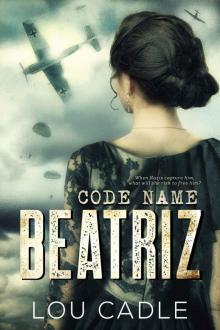 Code Name- Beatriz
Code Name- Beatriz Oil Apocalypse Collection
Oil Apocalypse Collection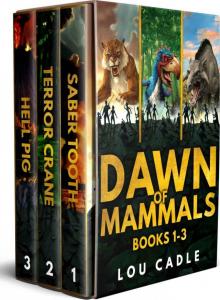 A Dawn of Mammals Collection
A Dawn of Mammals Collection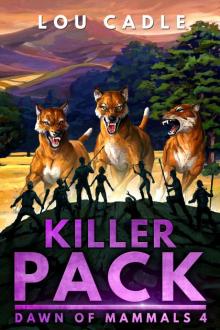 Killer Pack (Dawn of Mammals Book 4)
Killer Pack (Dawn of Mammals Book 4)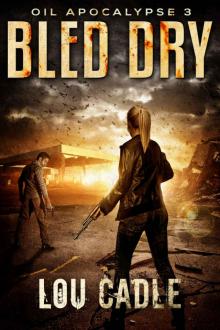 Bled Dry
Bled Dry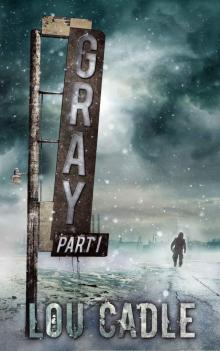 Gray (Book 1)
Gray (Book 1) Dawn of Mammals (Book 4): Killer Pack
Dawn of Mammals (Book 4): Killer Pack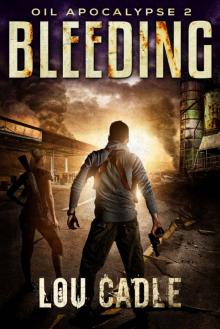 Bleeding (Oil Apocalypse Book 2)
Bleeding (Oil Apocalypse Book 2)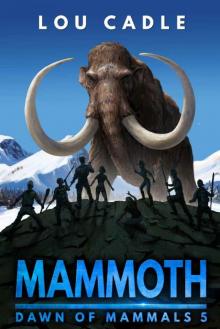 Dawn of Mammals (Book 5): Mammoth
Dawn of Mammals (Book 5): Mammoth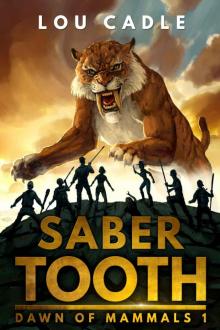 Saber Tooth (Dawn of Mammals Book 1)
Saber Tooth (Dawn of Mammals Book 1)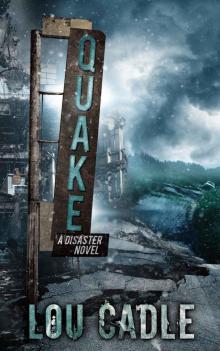 Natural Disaster (Book 2): Quake
Natural Disaster (Book 2): Quake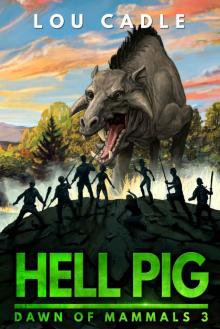 Hell Pig (Dawn of Mammals Book 3)
Hell Pig (Dawn of Mammals Book 3)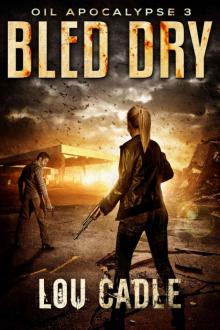 Bled Dry (Oil Apocalypse Book 3)
Bled Dry (Oil Apocalypse Book 3)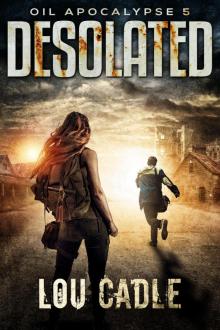 Desolated
Desolated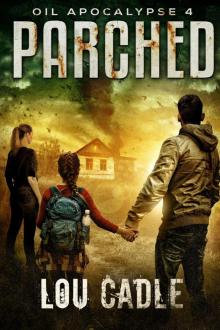 Parched
Parched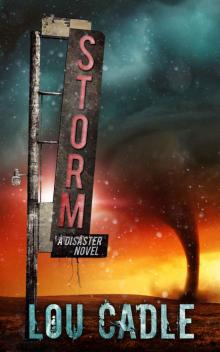 Natural Disaster (Book 3): Storm
Natural Disaster (Book 3): Storm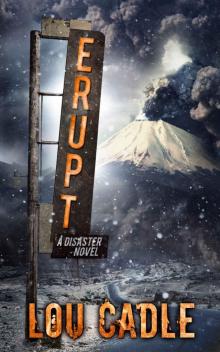 Natural Disaster (Book 1): Erupt
Natural Disaster (Book 1): Erupt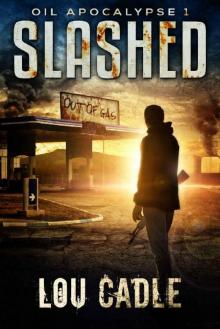 Slashed (Oil Apocalypse Book 1)
Slashed (Oil Apocalypse Book 1)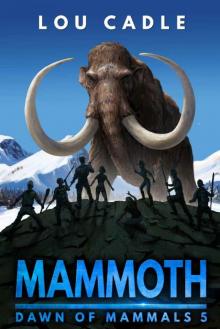 Mammoth (Dawn of Mammals Book 5)
Mammoth (Dawn of Mammals Book 5)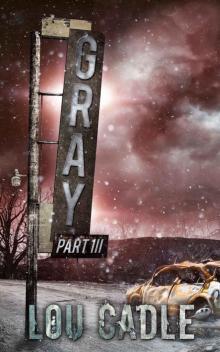 Gray (Book 3)
Gray (Book 3)